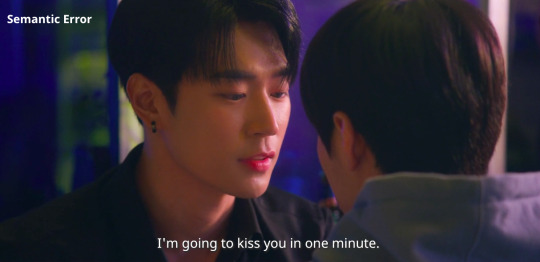#sluttiest (honorific)
Note
I'm new to bl so I apologize if my question is ignorant af. I'm watching Between us and like it so far. I got into bl via KP (there's just something addictive in it), but my absolute favourite is Semantic error. However, after those 2 series I for a long time struggled to find something that will work for me, and WinTeam finally did it. I love the characters of the 2 of them, there's even some plot, and the chemistry is through the roof. However, it kind of weirds me out that Win wanted Team to call him hia during lovemaking while at the same time him having two actual brothers is a huge part of who he is. Am I wrongly connecting "hia" with biological brothers? Maybe "hia" is something more in line with "bro"? Or not? Anyway, I love your approach to bl, and your humor.
No apologies necessary! Always delighted to meet a new fan. Welcome to the madness.

Ah, hia is more like phi, which means it operates as kind of a title and/or a pronoun as well as, in this context, an endearment. (more on honorifics, honorific pronouns, and polite particles here). The direct translation is put up as “bro” but it’s a lot more complicated than that.
For example, in English we may call a lover baby. That’s weird right? I mean think about it. Why would you call someone you’re fucking the title of a child? Creepy. Couples may continue to do such a thing even when they have babies of their own.
Or how about daddy?
Or in Kdrama’s the use of oppa? (Girlfriends to their older boyfriends, also means older brother, female to male)
Cultures tend to re-adopt familial terms for lovers a lot. It’s no weirder when it’s “sibling” (phi, hia, hyung, oppa, noona) than when it’s “child” (baby) or “father” (daddy), is it? Especially when the origin culture has a much more codified system of sibling honorifics and familial dynamics as part of their education and workplace environments (which both Korea and Thailand do, linguistically).
Actually, endearment use for familial honorifics is common in many collectivist cultures. I’ve been becoming more and more aware of the use of 哥 ge (older brother) 弟 di (younger brother) and 姐 jie (older sister) in Chinese romances. And I do not speak ANY Mandarin. (Incidentally that’s the same jay as in Thai for older sister of Chinese decent, the feminine version of hia.)

In Semantic Error during yaja time (at the bar right before their big mutual kiss) JaeYoung drops some of THE sluttiest hyungs every dripped out of the mouths of babes.
Hyung also means older brother, or roughly that. Again it’s also acts as an honorific. In this case it’s a blatant seduction. Prior to this he was very hung up on SangWoo’s utter refusal to use hyung on him, and upset that he simultaneously allowed oppa + a nick name from Ryu Ji Hye. I mean there was a respect thing going on there, but also an affection thing.
Here’s Asian Honorifics & BL - a quick & dirty guide, with examples
Meanwhile KinnPorche, Semantic Error, and Between Us is an interesting trifecta. Some others you might like?
From Thailand: Bad Buddy, TharnType, Cutie Pie, Lovely Writer, Manner of Death
From Taiwan: We Best Love, HIStory 2: Crossing the Line, HIStory 3: Trapped, See You After Quarantine?, DNA Says Love You
From Japan: Old Fashion Cupcake, Seven Days
From Korea: To My Star, Blueming, Long Time No See, Roommates of Poongduck 304
From China: Addicted: Heroin
All of these have pairs with killer chemistry and a decent story.
#asked and answered#thai honorifics#thai pronouns#korean honorifics#Thai Bl#KinnPorche#korean BL#Semantic Error#Between Us#Bad Buddy#TharnType#Cutie Pie#Lovely Writer#We Best Love#HIStory 2: Crossing the Line#HIStory 3: Trapped#See You After Quarantine?#DNA Says Love You#Old Fashion Cupcake#Seven Days#Japanese bl#To My Star#Blueming#Long Time No See#Roommates of Poongduck 304#Chinese BL#Addicted: Heroin#Asian Honorifics
197 notes
·
View notes